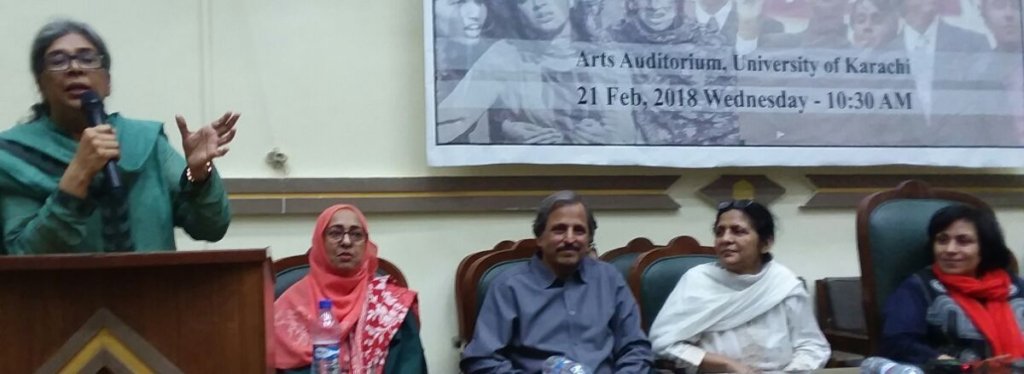Anayat Baig
KARACHI: Academics, student activists, and journalists emphasized the importance of freedom of expression and role of student unions in the promotion and strengthening of democratic culture and values on campuses and in society.
They held academics responsible for self-censorship, espousing anti-politics narrative, reinforcing the legacy of dictatorship and reducing the chances of the 60 percent youth bulge to build a democratic culture on campuses and society at large.
They expressed these views at a seminar on “Academic freedom and student unions” organised at the Karachi University the other day.
They expressed concern over the decline in education standards and rise in extremism and intolerance.
While fees are going up education standards are going down but religious and ethnic student bodies never raise their voice on these issues, they lamented.
Writer and former student activist Amar Sandhu spoke about the shrinking space for dissent views and rising extremism and intolerance in higher learning institutes partly because of self-censorship imposed by teachers themselves and partly by the state policies.
The teachers are afraid of teaching or hesitant to speak about Darwin’s theory of evolution, she said.
Senior journalist Mazhar Abbas, who had been an activist of Democratic Students Federation (DSF) a left-wing student organization, discussed the importance of student unions and its role in the democratic struggle in historical perspective.
He recalled that in the 60s and 70s students would participate in politics with an ideological commitment and indulge in healthy debate with rivals. They used to persuade students with arguments.
During union elections, rival groups used to campaign against each other and indulge in heated arguments but later sit on one table, Abbas said.
Student unions played a vital role in building popular movements. On campuses they mobilised around their own as well as bigger issues facing the country, he said.
But, he regretted, the whole situation changed when military dictator Ziaul Haq slapped a ban on student unions in 1984. Intolerance and extremism grew in higher learning institute.
The Zia regime did not clamp down on the Islami Jamiat-i-Talaba. As a result, the IJT established a monopoly on many campuses, often using force to regulate cultural norm s on campus, the journalist said.
s on campus, the journalist said.
Dr Naila Siddiqui of the Education Department read her paper on the importance of student unions in historical perspective.
Journalist and former DSF activists Afshan Saboohi shared her experiences as an activist and stressed the need for the revival of student unions.
Broadcaster and member of National Students Federation-GB (NSF-GB) discussed the adverse impact of the ban on unions has led to increase in violence, extremism and intolerance on campuses, citing the recent incident in Punjab university and murder of Mashal Khan in Abdul Wali Khan University, Mardan.
Students have been divided on ethnic and sectarian lines. That’s why they do not raise their voice in unanimity against their problems like a hike in fees, lack of facilities in hostels and other issues.
Students coming from far-flung areas and middle-class families are facing multiple problems such as shortage of hostels and hike in fees. Their hostels have been occupied by Rangers personnel. They are unable to raise their voice for their rights due to the absence of unions. The councils are divided to challenge the monopoly and nexus of IJT and the university administrations, he added.
In the question and answer session students asked questions from the panel about the presence of Rangers personnel on campus, the rise in jihadi mindsets and hike in educational expenses, teachers’ role in the revival of student unions and reports of corruption in universities.
Others who spoke on the occasion were Dr Naveen Haider of the Pakistan Studies Centre, Dr Hina Khan of the History Department, Dr Samina Hasnain of Islamic History Department.

The High Asia Herald is a member of High Asia Media Group — a window to High Asia and Central Asia



